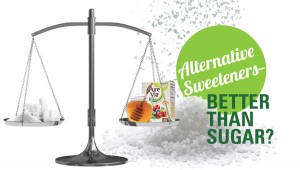 Over the last decade, sugar and high-fructose corn syrup—the most common sweeteners used in foods and beverages—have been shown to contribute to a number of health problems, from cavities to obesity to heart disease. As a result, many consumers are trying to cut back on added sugars. But they’re not willing to completely give up on sweets, instead turning to natural and/or low- or no-calorie alternatives to get their fix. According to advisory firm Lux, alternative sweeteners have now grown to represent 12 percent of the $73 billion global sweeteners market, and demand will continue to grow by 5 percent a year through 2017, reports market research firm Canadean.
Over the last decade, sugar and high-fructose corn syrup—the most common sweeteners used in foods and beverages—have been shown to contribute to a number of health problems, from cavities to obesity to heart disease. As a result, many consumers are trying to cut back on added sugars. But they’re not willing to completely give up on sweets, instead turning to natural and/or low- or no-calorie alternatives to get their fix. According to advisory firm Lux, alternative sweeteners have now grown to represent 12 percent of the $73 billion global sweeteners market, and demand will continue to grow by 5 percent a year through 2017, reports market research firm Canadean.
There are two main groups of alternative sweeteners: those that come from natural sources and those that are considered artificial. Natural sweeteners have seen the biggest gains in popularity in recent years. They include agave, honey, coconut sugar, monk fruit and stevia. Agave, honey and coconut sugar have about the same number of calories as regular sugar, but some consumers prefer them due to the fact that they are less processed and may offer other nutritional benefits, such as vitamins and minerals. Some, like agave, also tend to have less impact on blood sugar as compared to cane sugar. Monk fruit and stevia are also popular for their lack of impact on blood sugar. These sweeteners are non-nutritive, meaning they have no calories and don’t raise blood sugar at all.
Artificial sweeteners are also popular no- and low-calorie alternatives to sugar. Of course, sweeteners like this, including aspartame and saccharin, have been around for years. But consumers are now turning away from older formulations in favor of newer options they see as being, if not entirely natural, at least derived in part from nature—such as sucralose (Splenda), which is made partly from sugar, and xylitol, which is made partly from plants.
With over half of all consumers looking to cut back on added sugar and one-third looking to eliminate aspartame from their diets, according to the International Food Information Council Foundation, CPGs have started to integrate these newer alternative sweeteners into their offerings as well. For example, in 2014, Coca-Cola released a new version of Coke called Coca-Cola Life that replaces half of the sugar with stevia. In addition, just this spring, PepsiCo announced it’s changing the formula for Diet Pepsi to replace aspartame with sucralose.
As for whether these alternative sweeteners are better for you than sugar, Dr. Andrew Bremmer from the National Institutes of Health recently noted in an interview with Today’s Dietitian that, “whether something is a good choice or not often depends on the outcome being assessed. One could say, for example, that agave nectar may be better than [sugar] for people with diabetes because it doesn’t raise blood sugar as much… but it may contribute to liver disease and cause other important adverse metabolic outcomes.” In the end, most experts agree that all types of sweeteners—sugar and its natural and artificial alternatives—should only be used in moderation and mostly as an occasional treat, not a dietary staple.

